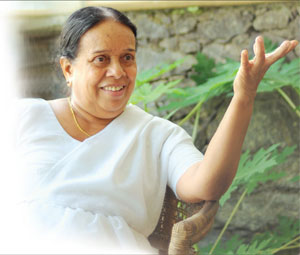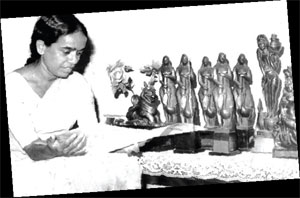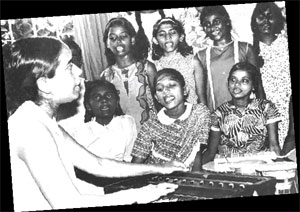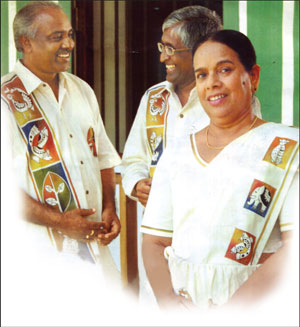|

Humanity in Song
Ruwini JAYAWARDANA
Talk about music and her name automatically crops up. The trademark
white sari draped casually, hair set in a bun and the melodious tunes
all combine together to make her the star that she is.
|

Renowned vocalist Nanda Malini. Picture by Lalith C Gamage |
Her inimitable deep voice opened a new chapter in Sri Lankan music
history and won her many accolades as the all time best female singer.
Indeed there is no one to challenge her. The public adores her voice and
embraces her work with passion.
Her talent is such that her name is often mentioned on the same
breath with the country’s most respected vocalist Pandith W D Amaradeva.
“There are many talented vocalists in the new generation. They are
able to sing popular old hits beautifully. However when they are asked
to sing an original they are bound to face failure. That is why these
new vocalists do not have stability. The generation of vocalists has
declined after Karunarathne Divulgane, Deepika Priyadarshani and Nirosha
Virajini,” says the songstress with a soulful voice, who despite her
fame remains totally unaffected, sans airs and graces. Still going
strong after more than five decades in the field, she looks to conclude
her popular ‘Shvetha Rathriya’ series this September. Our ‘Encounter of
the Week’ is with Sri Lanka’s melody queen Nanda Malini.
Q: Do you choose your songs only if its meaning agrees with
your own ideologies?
When I joined the music industry, I did not have an idea on what kind
of songs to choose. I sang the lyrics that I was given. But later I
realized that this is a very valuable profession. We should choose the
songs we sing by looking at them from all angles.
As I matured through experience, I realized that this is a subject
that can bring fame in an instance. You can also misuse this aspect
because today almost anyone thinks that they can become a vocalist.
I was determined to use my gift for the betterment of the society.
There are masses who listen to songs and during the 1960s we had only
the radio to communicate with them. The radio had its own set of rules
when a vocalist was given an opportunity to present a Sarala Gee
programme. We could not sing the songs we want because we had to get
their approval first by presenting them with the list. They also made
requests like including a children’s song or a patriotic song to the
list. This encouraged us to sing songs of various genres.

With some of her awards she won in
the early stages of her career |

Training children to sing |
The media does not impose such rules on the new generation of
vocalists. Therefore they do not possess songs of diverse genres among
their collections. Vocalists like Victor Ratnayake, Sanath Nandasiri, T
M Jayaratne and I belong to the generation after Pandith Amaradewa. We
have a strong foundation due to these reasons.
Q: Do you believe that music plays a vital role in bringing
about social reformation?
I strongly believe in that philosophy. We can awaken a nation through
songs. Though a song runs for two or three minutes, the aesthetic appeal
of the creation has a long lasting impact. We are able to set many of
our experiences or those around us into song lyrics. This becomes a
topic of discussion among the listeners through our songs.
I have put barriers in my life. I do not sing at weddings because I
believe that the people are not of the mindset to enjoy songs there. I
consider arts as a very duty-bound and majestic profession.
Q: Why have you refused to sing the song Me Sinhala Apage
Ratai?
I have never made such a statement. People have misinterpreted my
comment.
This song was penned by Mahagama Sekara for the 1963 film Saravita.
It was sung during a scene when a teacher was teaching her students
about the country. It raised no issue during that era but if Mahagama
Sekara wrote the song today, he would not have written it in that manner
because all the nationalities of our country are united under one flag.
It is difficult to categorize ourselves into sects now.
Nearly a year ago I set some of my film songs into a CD. I included
this song into that collection. This song cannot be eliminated from the
music industry. It had won hearts and awards. The only doubt that I have
is whether we can refer to it on the present context.
This issue of whether or not I am willing to sing this song came
about during one of my musical performances in UK in the 1990s. Certain
extremist groups too had come to watch the show and they began to shout
requesting for this song.
We normally attend shows after practising the 25 or 30 songs we have
selected for the event. We cannot change our routine if the audience
asks for a new song in the middle of a performance. That is why I did
not sing that song at that particular show.
Q: You have worked closely with Senior Professor Sunil
Ariyaratne and Rohana Weerasinghe in your career. How much have these
two figures contributed to enrich your work?
I have sung songs penned by some of the best lyricists in the
country. I attained fame through Galana Gangaki Jeevithe penned
Chandrarathna Manawasinghe for Ran Muthu Doowa. I met Mahagama Sekara
and Pandith Amaradeva and was in Amaradeva’s Madhuvanthi programme.
I believe that Senior Prof Sunil Ariyaratne’s collaboration helped me
excel in my career because his lyrics are written after much thought.
Rohana Weerasinghe mainly composed the melodies for these songs. I
believe that Rohana too had to work on diverse kinds of melodies
according to Ariyaratne’s lyrics.
Rohana is a spring of melody scores. He changes his melodies so that
it does not put the vocalist in an uncomfortable position. The three of
us get together and discuss about the song a lot before launching it.
We do not shy away from experimenting with different techniques and
this helped us move forward as a team. That is the secret of success
being our collaborative work.
Q: There are only a few duets in your song collection.
True. I must have sung about 10 duets in Madhuvanthi. I have sung in
choruses. Though I have about 700 to 800 songs to my name there must be
only about 30 duets in the list.
I haven’t got the opportunity to contribute to more duets. I haven’t
pursed the subject either.
|

With Rohana Weerasinghe and Prof Sunil
Ariyaratne |
Q: What are your thoughts on dividing popular and classical
music as good or bad?
We need a quality song culture: lyrics with aesthetic appeal, strong
melodies and quality vocals. This is what mature music enthusiasts seek.
There are some songs which they can relate to because those experiences
are common to them.
Those who engage in the popular music culture yearn for fame rather
than look for quality and meaningful lyrics and melodies.
This situation evolved with the ascending number of television and
radio channels. Song has become a means of money-making. They are not
interested in improve their singing capacities. However 90 percent of
our music lovers are mature and have high aesthetic tastes. They seek
satisfaction in listening to vocalist who dish out songs of high
quality.
Q: Lately live stage musical performances have become more of
a marketing campaign than productions of aesthetic value especially
because they do not present anything new to music enthusiasts.
I have done four musical concert series: Srawana Aradhana (with
Pandith Amaradeva), Sathyaye Geethaya, Pavana and Shvetha Rathriya.
Victor Ratnayake is doing his Sa concert for nearly 35 years. Both Sa
and Shvetha Rathriya will conclude soon. Only a few more vocalists are
engaged in similar musical series today.
These shows require a lot of money. Therefore it is difficult to
conclude one and begin on another. Such shows can only be taken forward
by artistes who have masses by their side.
Though there is an abundance of vocalists in the country only about
four or five of them are capable of taking this tradition forward.
I have always decided to stop my concerts series after it had run for
a certain period. Otherwise we too would be like machines engaging in
the same process over and over again. The appeal too would wither with
time.
Q: There is enthusiasm among the new generation of vocalists
on taking local songs to the international stage.
When we go abroad to sing at concerts the audience comprises Sri
Lankan fans. Language is a barrier for us to conquer the international
music arena. Only Dr Lester James Peries was able to overcome this issue
in local cinema. Pandith Amaradeva had made his mark in India. I do not
think we are still in a position to conquer the global music scene.
Q: What is your reaction to vocalists of the new generation
reciting your songs on stage?
Many new vocalists sing my songs. I am not against it because I too
sang Rukmani Devi’s and G S B Rani Perera’s songs when I entered the
scene. However when we have found our footing in the industry we need to
find our own identity. We are against them if these artistes try to
claim these songs as their own and include them in CDs.
They are endangering their talents if they keep on singing other’s
songs at concerts and parties. They would not be able to succeed when
they are asked to find their own voice through a new song. I have told
several popular reality television programme organizers to change their
structure and get the debutantes to enter the field through new songs. |



